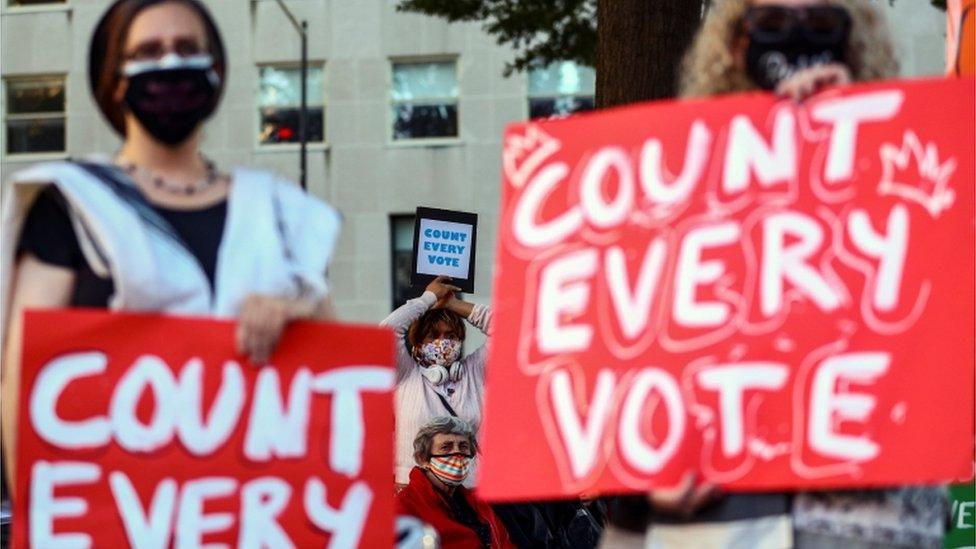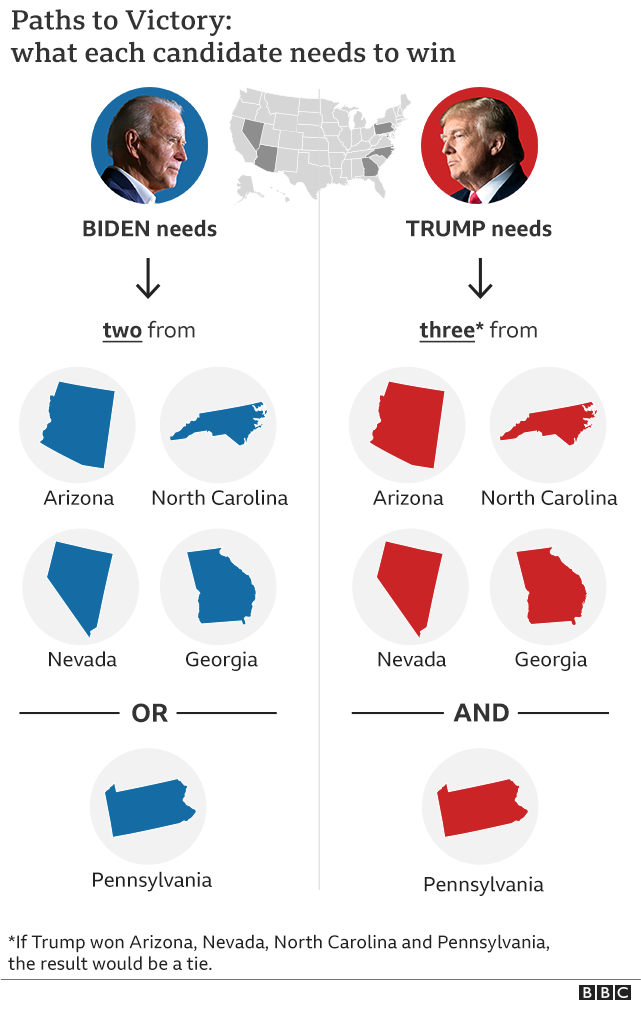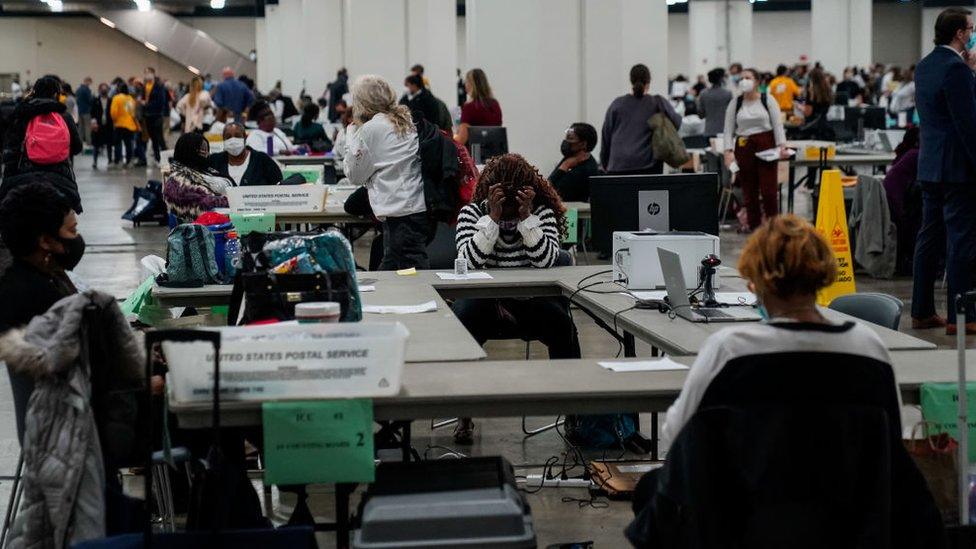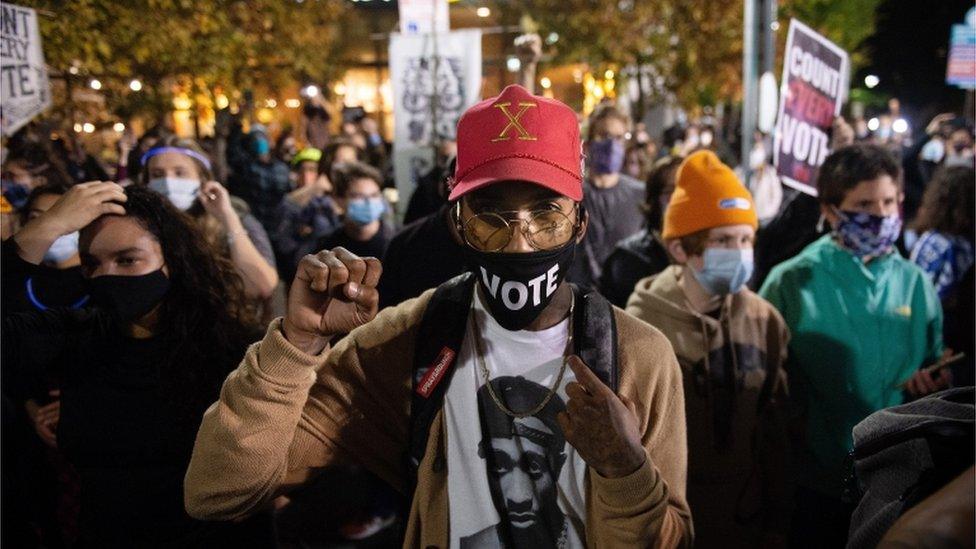US election results 2020: When will we know who has won?
- Published
It's been three days since the US election. You might have reasonably expected to have some kind of clue about the results by now.

Okay, so who is going to be the next president?
We still cannot say, because not enough votes have been counted for either Donald Trump or Joe Biden to claim victory.
But the moment we will be able to tell you someone has won does seem to be getting much closer. And results are still coming in.

The huge number of postal votes cast during this pandemic election, and different states' laws about how to count them, meant this always was going to take longer if the race was tight.
Hasn't Joe Biden won the popular vote?
Yes, so far, and by a big margin, but that's not what decides who gets to be president.
Instead, a candidate has to win the majority in a system called the electoral college, where each state gets a certain number of votes or "electors" roughly in proportion to its population. If you win a state, you win all its votes (except Nebraska and Maine, but that's complicated). There are 538 state votes and the person who gets 270 wins the prize.
So what are we waiting for now?
Mr Biden is on 253 electoral college votes to Mr Trump's 214. There are several ways each of them could reach 270.
If Mr Biden gets Pennsylvania, that's all he needs - he is over the line. Georgia and any of Nevada, Arizona or North Carolina works for him too.
Mr Trump would need Pennsylvania's votes and to win three states out of Georgia, North Carolina, Nevada or Arizona.


So how are they doing in these states?
Georgia (16 votes): The story here is about how Mr Biden ate into Mr Trump's lead in a solid Republican state as postal votes and tallies from more Democratic counties came in. Mr Biden has taken a very slim lead in the state and there are still votes to be counted, such as military and overseas votes. But because the margin is so tight, there is going to be a recount.
Pennsylvania (20 votes): There are fewer than 115,000 mail ballots left to count, external, and Mr Biden has now taken the lead. As mail ballots in most places tend to go Democratic, analysts are watching to see how wide this lead gets.
Nevada (6 votes): Mr Biden has pulled ahead in Nevada. About 150,000 ballots are yet to be counted, many of them from Clark county, which leans Democratic.
Arizona (11 votes): Joe Biden has a lead that is narrowing. Many of those votes still to be counted are from Maricopa County, home to 60% of the state's population - and Mr Trump has been catching up a bit as these votes get counted.
The story in one line?
Donald Trump has done better than expected and Joe Biden has failed to win those battleground states which count votes quickly, but the Democrat is closing the gap in crucial states as votes get counted.


Why do the numbers keep changing?
Each state has its own laws and systems for counting votes. Individual states are also in charge of the order in which they count different types of votes - for example postal votes are often counted last.
So that makes a difference when Republicans tend to vote in person on the day and postal votes tend to skew Democratic. As there were so many postal votes cast during this pandemic election, this is why we have seen such late dramatic shifts in who leads a race.
Another thing to be aware of is that different news outlets have different tallies for each candidate depending on where they get election data from. So some outlets have called Arizona for Mr Biden, but the BBC thinks it's still not decided.
Mr Trump has launched some legal challenges, but analysts suggest most of these challenges concern small numbers of ballots that might not make a difference in the end, with the exception of Pennsylvania, where the Supreme Court previously hinted it could revisit the rules about deadlines for accepting postal votes.

Poll officials in Michigan - now projected for Biden - work to tally ballots
But the story here is not just the maths.
It now looks like polling data ahead of the election didn't tell us the whole story about the American public. Many observers didn't realise the race would be so tight.
Robert Cuffe, the BBC's head of statistics, says it's still too early to say whether this election has been a pollster's nightmare. Final national polls showed Mr Biden leading Mr Trump by about eight points. In battleground states Mr Biden also polled in the lead, but by a much slimmer margin.
Currently Mr Biden leads Mr Trump in the share of the popular vote by about three percentage points.

Some experts suspect there's a part of the American public which won't even participate in polls because they don't trust institutions - they're more likely to vote for Mr Trump.
Voter priorities may have also been slightly misjudged. While the coronavirus pandemic has dominated headlines, a survey conducted by Edison Research found that more voters (a third in total) listed the economy as their key issue - it was a core Trump message.
Mr Trump's vote also looks a little bit more diverse than many might have assumed.
You can read more about the results here.